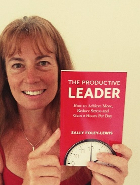Book review - The Productive Leader by Sally Foley-Lewis

At the heart of this book is a simple model that allows the reader to analyse and then improve the different aspects of productive leadership.
The model is a traditional trefoil encompassing Personal, Professional and People productivity. This is immediately and easily translatable from the book's focus on the productive leader (as an individual) to a focus on the productive board (or any other identifiable group that you may work with or within). The tools for personal, professional and people productivity are clear and useful; albeit not entirely new. However, they are backed by some impressive research (did you know that 78% of people say they would work harder if they were better recognised and appreciated?) and then extended into some ground-breaking new areas.
Sally (I am honoured to count her among my professional friends and recognise that she is one of the most transformational speakers on the professional speaking circuit) has focused not just on the three aspects of productivity but also on the intersections between them. This is highly prospective ground.
For example the intersection between personal and professional productivity relies upon clarity. In the board environment this is all about setting clear matters reserved for the board, goal-setting, prioritising, and the value and methods of work being done to lift productivity. At the intersection between professional and people productivities are boundaries; we all know that good fences make good neighbours but we rarely consider how the establishement of clear accountabilities can provide the basis for personal, and board, productivity. At the intersection between personal and people productivities are relationships; between the individuals on the board, and between the board and other stakeholders, such as management, shareholders, regulators, customers, and host communities. Applying these lenses to the areas where productivity is
required to improve allows great insights.
I have been carrying this book around in my briefcase and cabin-luggage for two months. It gives great insights into the interactions that I have with my co-directors and others. It is making a difference (and I am already highly productive). I recommend that you try it also. It may well make a great difference for you too.
Available in soft or paperback format through Amazon.com
What's New - In February
I decided to experiment with video as a communication tool for short messages. I published an article on LinkedIn 'How much Diligence is Due?' and then made a short video 'What you don't know can hurt you' highlighting some of the messages. I am interested to hear which you prefer and why.
If the readers enjoy it, I will attempt more videos in future.
February was a busy month with my own boards taking up much of my time. Preparing for an IPO is never easy! Still, good progress was made and we are all further advanced than we were in January.
It was a great pleasure to help a visiting journalist with setting up and attending a series of interviews about corporate governance and the ASX. So nice to see our exchange generating engagement and interest around the world.
Another highlight was (finally!!) getting a whole new website especially dedicated to the director's Dilemma. You can check it out at www.directorsdilemma.com. I really hope you will like it and find a use for the archive of over ten years' of published dilemmas and responses.
I also enjoyed attending a strategy workshop for my own government sector board and hosting a workshop for a professional association (not the one that Xandra is a director for).
Some sailing on beautiful Sydney Harbour, a 25th wedding anniversary, and a workshop on how to make videos filled in the personal time and made this a satisfying and busy month.
As this newsletter goes out to you, I am in Melbourne at the AICD Governance Summit looking forward to hearing the latest news and ideas from directors and for directors; it would be a delight to say 'hello' if you see me there!
I am always keen to work more and will be delighted to hear from you if you would like to arrange a board strategy workshop or board performance review!
Inspirational quote for March - This month my favourite quote is:

A note on names - A few readers have asked me where I find the names for the protagonists in each case study. I can only say that I 'borrow' them from people I meet or things that I read. Xandra is a Greek name, the feminine form of Alexander, and means 'defender of mankind'. Our protagonist is a 'defender of the members' interests and that is a great attitude for an association director.
This newsletter - If you have any ideas for improving the newsletter please let me know. If you are reading a forwarded copy please visit my website and sign up for your own subscription.
Suggestions for dilemmas - Thank you to all the readers who have suggested dilemmas. I will answer them all eventually. I could not write this newsletter without your help and without the generous help of all the experts who respond each month to the case studies.
Be a contributor - if you would like to attempt a response to the dilemmas for publication you will be most welcome. Simply reply to this email and let me know.
Let's connect - I use LinkedIn to share information about boards and directorship with my friends and acquaintances. If you use LinkedIn and we are not yet connected I will welcome a connection from you. You can find me at linkedin.com/in/juliegarlandmclellan.
Let me help you - If you would like me to speak to or train your board, staff, audience and/or group please contact me at julie@mclellan.com.au.
Where to book Julie as a speaker - You can book me through the following speaking bureaus and agencies:
Farewell until the next issue (due 1 April 2018). I look forward to greeting you again then. In the interim I hope you will enjoy health, happiness and hard work.
Enjoy governing your corporations; we are privileged to do what we do!
Best regards,
Julie
 Xandra chairs the audit committee of a small professional association. She has a strong working relationship with the chair and CEO who are implementing a strategic reform based on 'user pays services' to redress a fall in membership numbers and hence revenue. The strategy bravely introduced a reduced membership fee compensated by charges for advisory services and an increase in the cost of member events and education.
Xandra chairs the audit committee of a small professional association. She has a strong working relationship with the chair and CEO who are implementing a strategic reform based on 'user pays services' to redress a fall in membership numbers and hence revenue. The strategy bravely introduced a reduced membership fee compensated by charges for advisory services and an increase in the cost of member events and education.
 The Board has some leverage in this matter - not only could they refuse the request on the basis of technical deficiency, but the proposed motions may be out of order. Normally the setting of member fees and the hiring and firing of the CEO would be board matters.
The Board has some leverage in this matter - not only could they refuse the request on the basis of technical deficiency, but the proposed motions may be out of order. Normally the setting of member fees and the hiring and firing of the CEO would be board matters. Xandra is right to query the wisdom of 'pushing back'. Some of the most highly engaged members of her association are unhappy with the strategy. These are the members the Association most needs.
Xandra is right to query the wisdom of 'pushing back'. Some of the most highly engaged members of her association are unhappy with the strategy. These are the members the Association most needs. Advice that Xandra should give to her chairman:
Advice that Xandra should give to her chairman:


